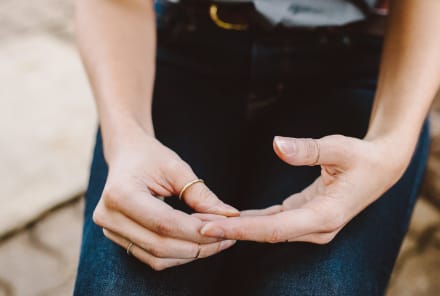Advertisement
An Introduction To Myung Sung, The Korean Art Of "Living Meditation"

Most forms of meditation ask us to be still and quiet, to take time away from our busy lives and forget about our ever-growing to-do lists. Myung Sung does the opposite.
This Korean form of meditation that I learned at a young age is active, dynamic, and woven into our everyday experience. More philosophy than active practice, it's a living meditation that helps us engage with life more deeply and discover our place and purpose in the world.
All living things share a connection. Some call this an energy, others a life force. I like to simply call it connectedness. When we begin practicing Myung Sung, we become more aware of this connectedness. We start learning more about ourselves, our relationships, and our effect on the world around us.
Of course, these lessons do not come overnight! But by practicing the following eight keys of Myung Sung, you can begin finding this greater sense of peace and connection—without needing to sit still on a meditation pillow:
Key 1: Know your true self.
Life presents us with unlimited opportunities to learn about our true selves. If we pay attention, we can begin to notice what thoughts are influenced by others and what feelings are temporary and fleeting. We can learn to identify what part of us is our true self. Knowing who we truly are puts us on a path to become the greatest version of ourselves. We feel more grounded and are able to see our purpose more clearly.
Key 2: Balance what is right and what is true.
We often feel indecisive or make choices that put us on the wrong path because we confuse what is true and what is right.
The true decision is the reflection of our inner state. It's how we feel about a situation and what our true self is telling us is best. The right decision is what is best for everyone else involved. According to Myung Sung philosophy, the correct choice balances what is right and what is true. As we become more in tune with ourselves and the greater connectedness, we develop a moral compass that makes it easier to make decisions.
Key 3: Avoid Doe Chi, or "being drunk on your own thoughts."
In Korean, there is a phrase—doe chi. It means to be "drunk on one's thoughts." We use this phrase to describe those who allow their thoughts and beliefs to limit their view.
People who are doe chi are only concerned with their own self-interests. They see life through tunnel vision, never the whole picture, which makes them blind to the solutions to their problems.
It is as if you were wearing sunglasses all day and night and complaining that everything is too dark—and then going on to blame others for the darkness. Yet your vision is obscured because you have sunglasses on. No matter how much you complain or try to have others remedy the situation for you, nothing will ever change until you see that the answer is solely dependent on you.
To practice Myung Sung, we must widen our perspective, putting ourselves in the shoes of others involved and seeing the bigger picture, and then we must take accountability for our actions and see our circumstances clearly. Through this, we become empowered to change our own reality.
Key 4: Become a legacy of goodness.
We are all going to leave a legacy. For most of us, our names and faces won't be immortalized, but the actions we take will still have a ripple effect on future generations.
Too often, we focus on gaining material possessions, wealth, and fleeting forms of happiness and leave nothing of true value after we're gone. When we begin looking for ways to plant seeds of goodness for future generations, we often notice that there are small, everyday opportunities to do so all around us.
Key 5: Live with honor.
To live with honor means to respect others for the role they perform for the good of all. This respect is not based on believing that if you do good, it could come back to benefit you in some way. Rather, it's a deep appreciation and underlying love for all living things.
Recognizing and honoring our connectedness means responding to the world with kindness and compassion because we never know fully what others have been through and we never want to add any sort of harm into the universe.
Key 6: Change your reality for the better.
We all have the ability to change our realities for better or for worse. When we let outside factors influence our inner selves, our realities are always emotionally turbulent. Negative situations feel imprisoning, and we lose sight of ourselves and our goals.
When we let our inner world determine our outer reality instead, we can cultivate a sense of deep peace and strength to carry us through every situation. We become empowered and can take on new challenges and handle times of tension and discomfort with a greater sense of ease, knowing that they are temporary. We are able to hold a clear vision for greater things on the horizon.
Key 7: Be a vessel of wisdom.
Wisdom is the food of enlightenment. It opens our minds, generates peace, and brings us closer together. To practice Myung Sung, we need to seek opportunities to gain wisdom wherever we go. Wisdom is different from knowledge because it cannot be taught. It must be experienced firsthand. Just as no one can eat for you, no one can seek wisdom for you either. It is a journey that is entirely your own.
Key 8: Work in harmony with your surroundings.
Trying to live your life against the natural order is like trying to swim upstream. Not only will you not make much progress, but you will waste all of your energy in the process too. As we learn to see the connectedness of the world more clearly, we all need to constantly live in harmony with it. When we follow the flow of nature, we live in balance with the natural order, and we can achieve a greater sense of well-being for our mind, body, and spirit.
Watch Next
Enjoy some of our favorite clips from classes
Enjoy some of our favorite clips from classes
What Is Meditation?
Mindfulness/Spirituality | Light Watkins
Box Breathing
Mindfulness/Spirituality | Gwen Dittmar
What Breathwork Can Address
Mindfulness/Spirituality | Gwen Dittmar
The 8 Limbs of Yoga - What is Asana?
Yoga | Caley Alyssa
Two Standing Postures to Open Up Tight Hips
Yoga | Caley Alyssa
How Plants Can Optimize Athletic Performance
Nutrition | Rich Roll
What to Eat Before a Workout
Nutrition | Rich Roll
How Ayurveda Helps Us Navigate Modern Life
Nutrition | Sahara Rose
Messages About Love & Relationships
Love & Relationships | Esther Perel
Love Languages
Love & Relationships | Esther Perel

















